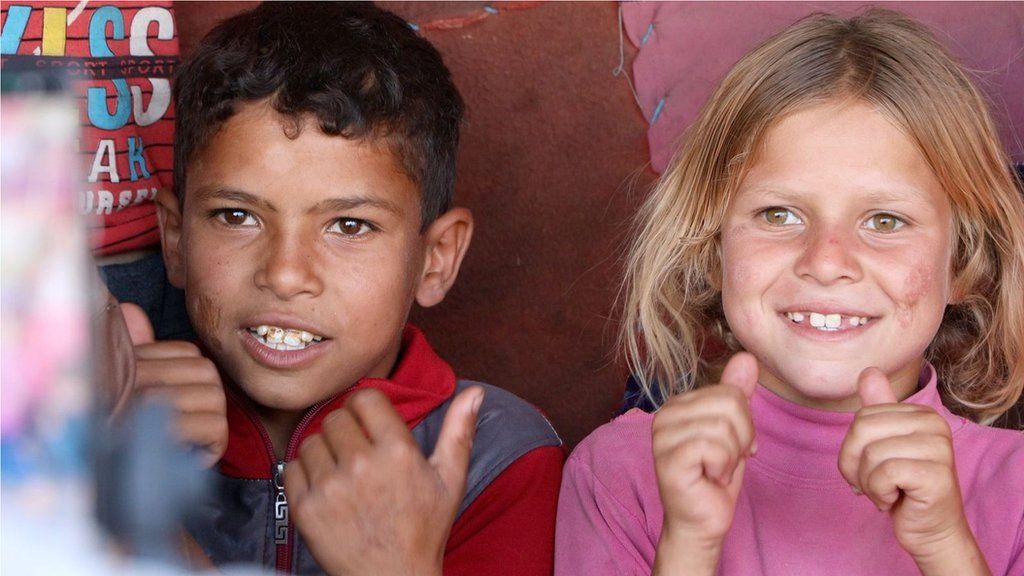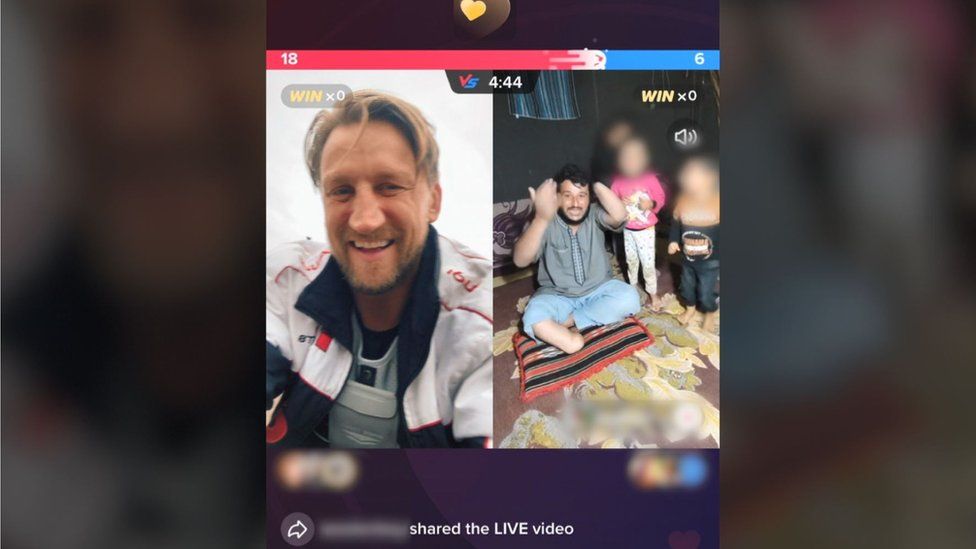A woman says she and her daughters need money to pay for hospital treatment.
Refugee families in Syrian camps are begging for donations on TikTok while the company takes up to 70% of the money, according to a report.
Children are streaming on the social media app, begging for gifts with a cash value.
The streams earned up to $1,000 an hour, but only a small amount of it went to refugees.
TikTok said it would act quickly against begging.
The company said that it did not allow this type of content on its platform and that its commission from digital gifts was less than 70%. It wouldn't confirm the amount.
TikTok users saw their feeds fill with livestreams of refugee families in Syrian camps, drawing support and concern from some viewers.
In the camps in north-west Syria, the "TikTok middleman" provided families with the phones and equipment to live.
Families were given access to TikTok accounts by agencies in China and the Middle East, according to the middleman. TikTok has a global strategy to recruit and encourage users to spend more time on the app.

Since TikTok suggests content based on the location of a user's phone number, the middleman said they prefer to use British sim cards. People from the UK are said to be the most generous gifters.
The families on TikTok sit on the floor of their tent for hours, repeating the English phrases "please like, please share, please gift"
She is using the livestreams to raise money for an operation for her daughter, who is blind, after her husband was killed in an air strike.
They're asking for virtual gifts that cost viewers real money and can be withdrawn from the app as cash. Digital roses, virtual lions, and other gifts are sent to creators by Livestream viewers.
The BBC followed 30 TikTok accounts broadcasting live from Syrian refugee camps and built a computer program to get information from them, showing that viewers were often donating digital gifts worth up to $1,000 an hour to each account.
The families in the camps said they were only getting a small portion of the money.
The BBC ran an experiment to find out where the money goes after TikTok declined to say how much it takes from gifts.
One of the TikTok-affiliated agencies received a call from a reporter in Syria who said he was in the camps. He was able to open an account and received gifts from another account.
The balance of the Syrian test account was $33 at the end of the live stream. TikTok took the lion's share of the gifts' value.

During a family's livestream on TikTok, Mason encouraged his nearly one million followers to donate money as well.
He said it was ridiculous and unfair that most of the money was taken by the social media company.
There needs to be some transparency. That is very greedy to me. He said it was greed.
When the money was taken out of the local money transfer shop, the remaining $33 was reduced by 10%. A family with just $19 is left by TikTok middleman.
Hamid said he sold his livestock to pay for a mobile phone, sim card and wi-fi connection in order to help people on TikTok.
He broadcasts with 12 different families for a long time.
Hamid said he helps families make a living. He pays most of the profits without his running costs.
Hamid said he was supported by live agencies in China who worked with TikTok.
If there is a problem with the app, they help us. The blocked accounts are unlocked by them. They open the account by giving them the name of the page, the profile picture, and the account number.
Families go on TikTok. TikTok received a commission from digital gifts.
Agencies like these, known as "live streaming guilds" and based all around the world, are contracted by TikTok to help content creators produce more appealing livestreams
According to the agencies, TikTok pays them a commission based on the duration of livestreams and the amount of gifts received.
Children in the Syrian refugee camps go live for hours at a time.
Marwa Fatafta from Access Now says that the livestreams run contrary to the policies of TikTok.

Hundreds of families in refugee camps in Syria are begging for gifts on TikTok broadcasts.

"TikTok clearly states that users are not allowed to explicitly solicit gifts, so this is a clear violation of their own terms of service, as well as the rights of these people," she said.
She acknowledges that people have the right to share their stories online, but she says they lack dignity and humiliation.
Before you can go live on TikTok, you have to have 1,000 followers, you have to not solicit for gifts, and you have to prevent the harm, endangerment or exploitation of children.
TikTok said there had been no violation of its policies in any of the 30 accounts it was used to report.
The company banned all of the accounts after being contacted by the British Broadcasting Corporation.
We are concerned by the information and allegations that have been brought to us, and have taken swift and thorough action.
This type of content is not allowed on our platform.
According to Sensor Tower, TikTok has made more than $6.2 billion in gross revenue from in-app spending since it was launched.
As an alternative to making money on TikTok Live, the British Broadcasting Corporation approached several charities working in Syria to support families in the camps.
Takaful Alsham said it would provide basic supplies to the families for the next three months to help them find schools.
There are few ways to make money in the camps. Most of the money donated goes to TikTok, and hundreds of families continue to live.
Additional research and reporting was done by Mohammed Abdullah.